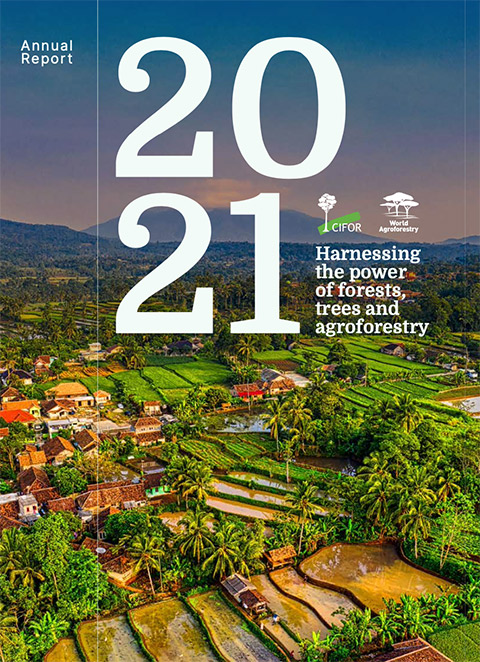A decade of collaborative research and action
The CGIAR Research Program (CRP) on Forests Trees and Agroforestry (FTA) is celebrating 10 years of impactful research for development. Between 2011 and 2021, led by CIFOR-ICRAF and its strategic partners – the Alliance of Bioversity International and CIAT, CATIE, CIRAD, INBAR and Tropenbos International – FTA upheld trees and forests as drivers of transformational change.
Last December, FTA held a ‘final’ event to wrap-up the CRP, bringing together scientists and policymakers. This was an occasion to present the FTA Highlights of a Decade series, an 18-volume collection that showcases the partnership’s most powerful contributions to key development targets. FTA also published the Integrative Impact Studies, a set of programme-wide impact assessment studies that document the ways FTA has contributed to protecting forests, restoring degraded lands, reducing unsustainable land-use practices, eliminating rural poverty and supporting nutritious diets.
These studies demonstrate that FTA’s contributions have resulted in: enhanced protection for 26–133 million ha of forests, representing 24–125 Gt of avoided CO2 emissions; between 2–35 million ha of land brought under restoration; better management for 60–204 million ha of land; additional means to exit poverty and reduce vulnerability for 5.1–19.0 million people; and additional means to improve food security and nutrition for 1.1–3.5 million people.
It was a year oriented towards influencing the major global conferences on biodiversity (CBD Kunming 2022, UNFCCC Glasgow and UN Food Systems Summit-UNFSS).
Towards UNFSS, FTA contributed to the public consultations for the five UN Action Tracks and proposed 11 game-changing solutions for sustainable food system transformations, some of which were retained in the final set of recommendations of the Summit. As founder of the Transformative Partnership Platform (TPP) on Agroecology, FTA organized the official launch of the TPP during a side event of the 48th Committee on Food Security (CFS48). The Agroecology TPP brings together scientists and practitioners to devise alternatives to intensive industrial agriculture and contributed to the emergence of the coalition for agroecology out of the UNFSS. Following its launch, FTA facilitated the TPP’s global presence through several events:
10 years of impact
78
countries with FTA projects
$818
million in funding
>450
partnerships over 10 years
>6k
research publications
cited>80k
times
with>5.5
million downloads
On the ground
up to133
million ha of forests protected
24–125 Gt
of avoided CO2 emissions
Reduced vulnerability/poverty for5–19k
million people
Policies for Agroecology (July), the Million Voices Initiative (September, at the UNFSS), Research on Agroecology (October) and at GLF Glasgow.
Towards CBD, FTA organized, in partnership with CAF and the Kunming Botanical Institute, the hybrid Kunming Biodiversity Conference, leading to 12 key policy recommendations that support biodiversity for use by stakeholders to the CBD.
During UNFCCC COP26 in November, FTA hosted several talks at the GLF Climate: Frontiers of Change hybrid conference. It launched its FTA Highlights series and the first co-publication with FAO on Asia-Pacific Roadmap: Forestry innovations from youth in the Asia-Pacific Region.
In 2021, the programme held a wrap-up seminar on its COVID-19 rapid research response, launched in 2020, with the final results of several key studies. FTA also led a working group of the CGIAR Covid-19 Hub – Working Group 4, which contributed to the first world-level assessment on the impacts of COVID-19 on food security, and to a set of studies on building food system resilience. The results were presented at the Building forward better: Pathways to resilience webinar in December.
FTA also launched two innovative communications campaigns – the Google Arts and Culture partnership and From Tree toFork – to raise awareness about the vital role trees play in food security and human development. These stunning digital displays communicated to a mass audience the real day-to-day benefits from trees and forests.
This year’s achievements were only possible thanks to the decade of work from all FTA partners. Together, they helped FTA achieve the highest collaboration index (6.48) of any CRP. Grounded in scientific evidence, the partnership published over 6,000 research papers, which were cited around 79,500 times and downloaded over 5,550,000 times. A complete database is available at foreststreesagroforestry.org/publications, 73% of which is open-access. An independent review conducted in 2020 outlined FTA’s high scientific productivity, ranking FTA first out of all CRPs for collaboration and among the first three for policy innovations and progress toward planned outcomes.
As 10 years of co-constructed research, discovery, innovation and advocacy wrapped up (as a CGIAR Research Program), the evidence shows that forests, trees and their environments play a critical role in achieving the aims of Agenda 2030 and beyond. With the momentum of a decade behind it, FTA has begun re-imagining itself and is looking forward to the launch of a new research-for-development partnership for forests, trees and agroforestry in 2022.
CGIAR Research Programs
CIFOR-ICRAF has worked closely with other CGIAR Research Programs (CRPs), which also concluded in December 2021 as the One CGIAR initiative was launched
Our long-term engagement with the CRP on Policies, Institutions and Markets (PIM) produced a wealth of scientific publications and knowledge products over the year, including a brief series and webinar on governance of natural resources, an interactive map on community forest management in the Peruvian Amazon and a capacity-building workshop in forestry development for Indonesian government officers. Work on multistakeholder forums included a 7-part series in a special issue of the International Forestry Review with an associated news series, and a webinar titled ‘Puzzle pieces or poker chips?’ hosted by CIFOR-ICRAF Principal Scientist Anne Larson. See also the story on gender highlights for PIM- related outputs.
CIFOR-ICRAF also worked with the CRPs on Climate Change, Agriculture and Food Security (CCAFS) and on Water, Land and Ecosystems (WLE).

